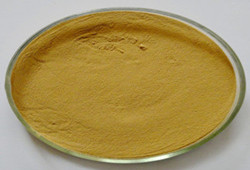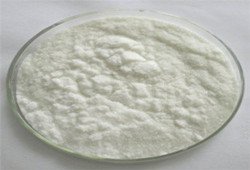Silymarin series |
 |
Silymarin, a standardized extract of the milk thistle seeds, containing a mixture of flavonolignans consisting of silibinin, isosilibinin, silicristin, silidianin, and others. The mixture exhibits a number of pharmacological effects, particularly in the liver, and there is some clinical evidence for the use of silibinin as a supportive element in alcoholic and child grade 'A' liver cirrhosis. |
|
| |
Name |
CAS number |
chemical formula |
Specifications |
| Silymarin (Extract by Acetone) |
65666-07-1 |
C25H22O10 |
HPLC 50% (Silybin30%) |
| HPLC 55% (Silybin35%) |
| HPLC 60% (Silybin40%) |
| UV70% |
| UV75% |
| UV80% (Silybin&Isosilybin 30%) |
| Silymarin (Extracted by Ethyl Acetate) |
65666-07-1 |
C25H22O10 |
UV70% |
| UV80% (Silybin&Isosilybin 30%) |
| HPLC 50% (Silybin30%) |
| HPLC 55% (Silybin35%) |
| HPLC 60% (Silybin40%) |
| Silymarin (Extracted by Ethanol) |
65666-07-1 |
C25H22O10 |
UV70% |
| UV80% |
| HPLC 55% (Silybin35%) |
| HPLC 60% (Silybin40%) |
| Water Soluble Silymarin (Silymarin soluble) |
|
|
UV20% |
| UV40% |
| UV45% |
| Silybin (Silibinin,Silybine) |
22888-70-6 |
C25H22O10 |
70%-99% (HPLC) |
| Silybin Meglumine (Water soluble silybin) |
|
C32H39O15N |
>96% (UV) |
|
Features:
1. Protect liver cells from toxic substances
2. Strong antioxidant function to protect liver cells from free radical damage
3. Promote protein synthesis and accelerate the production of new liver cells
4. Anti-radiation, anti-aging;
5. Prevent arteriosclerosis, delay skin aging
6. Inhibition of lipoxygenase and peroxidase |
| |
Carnitine series |
 |
Carnitine is a quaternary ammonium compound involved in metabolism in most mammals, plants and some bacteria. Carnitine may exist in two isomers, labeled D-carnitine and L-carnitine, as they are optically active. Carnitine is the generic expression for a number of compounds that include L-carnitine, acetyl-L-carnitine, and propionyl-L-carnitine. The body synthesizes enough carnitine from lysine side chains to keep up with the needs of energy production in the body as carnitine acts as a transporter of long-chain fatty acids into the mitochondria to be oxidized and produce energy. Some individuals with genetic or medical disorders (like preterm infants) cannot make enough, so this makes carnitine a conditionally essential nutrient for them. |
|
Name |
CAS number |
chemical formula |
Specifications |
| L-Carnitine Base |
541-15-1 |
C7H15NO3 |
USP30 97-103% |
| EP 6.0 98-102% |
| L-Carnitine Tartrate |
36687-82-8 |
C18H36N2O12 |
¡Ý98% |
| Acetyl-L-Carnitine Hydrochloride |
5080-50-2 |
C9H18ClNO4 |
Enterprise Standard 98-101% |
| KPC¢ò98-101% |
| L-Carnitine Fumarate |
90471-79-7 |
C11H19NO7 |
¡Ý98% |
| 50% L-Carnitine Feed Grade |
|
C7H15NO3 |
Enterprise Standard ¡Ý48.5% |
| DL-Carnitine Hydrochloride |
461-05-2 |
C7H16ClNO3 |
Feed grade ¡Ý99.0% |
| JPC97 ¡Ý98.5% |
| Trimethylamine N-oxide dihydrate |
62637-93-8 |
C3H13NO3 |
99% |
|
Features:
1. Promote the transportation and oxidation of fatty acids;
2. Promote the use of carbohydrates and amino acids;
3. Improve the body's tolerance and prevent the accumulation of lactic acid;
4. Cardioprotective agent;
5. Accelerate sperm maturation and improve vitality;
6. Delay aging and anti-oxidation;
7. Lower blood cholesterol and triglycerides; Reduce weight. |